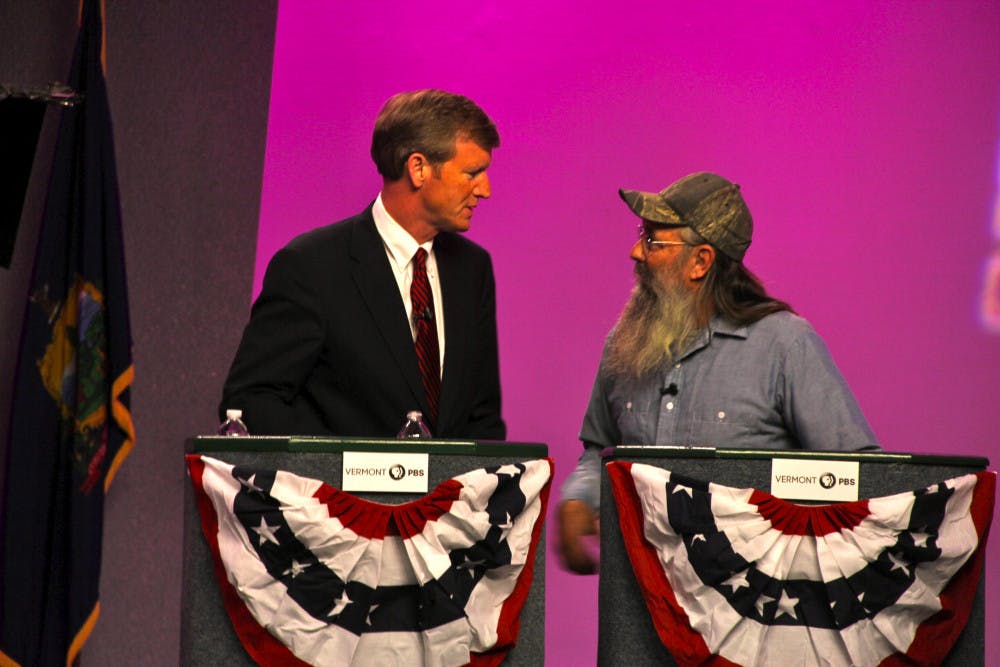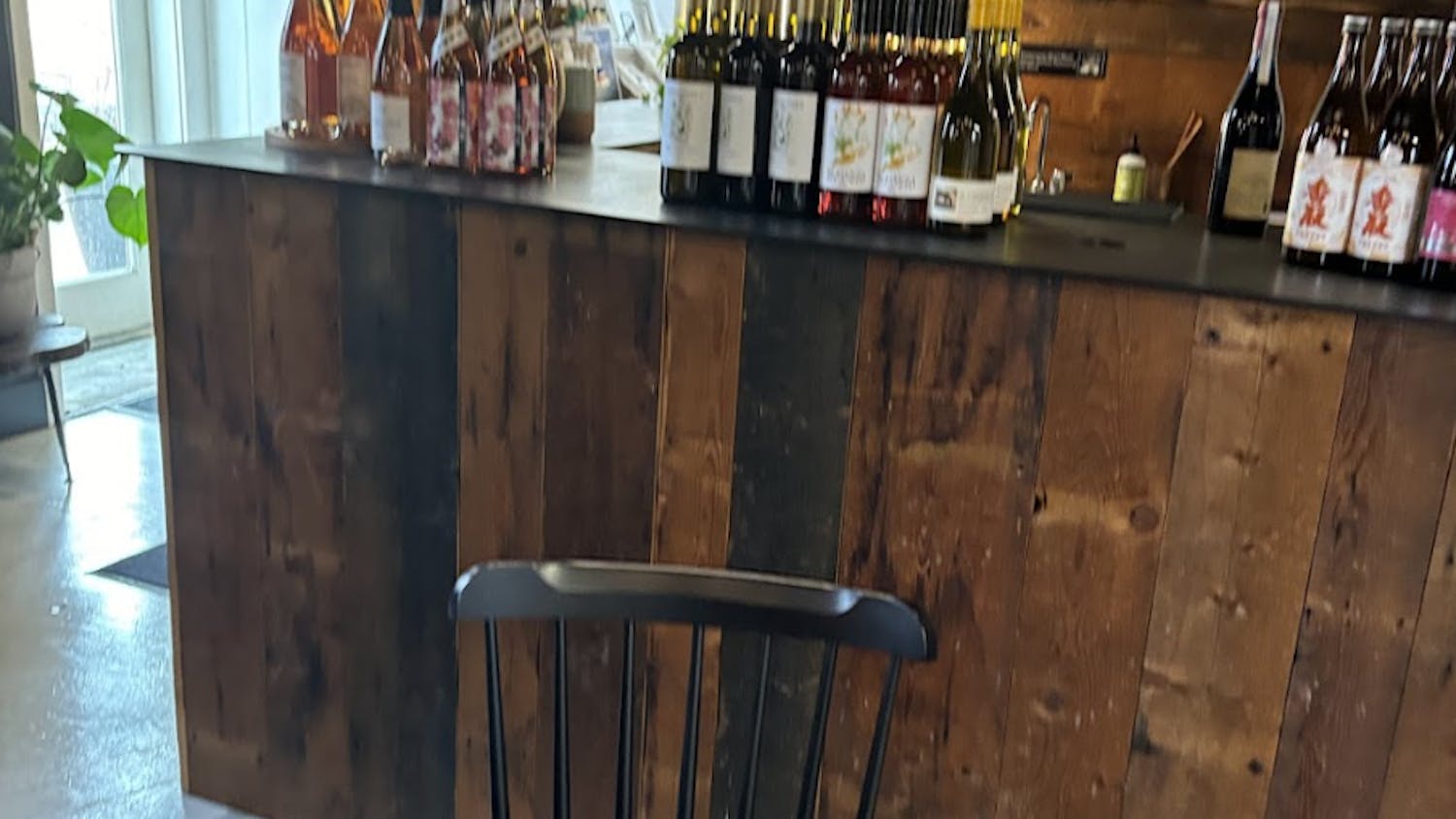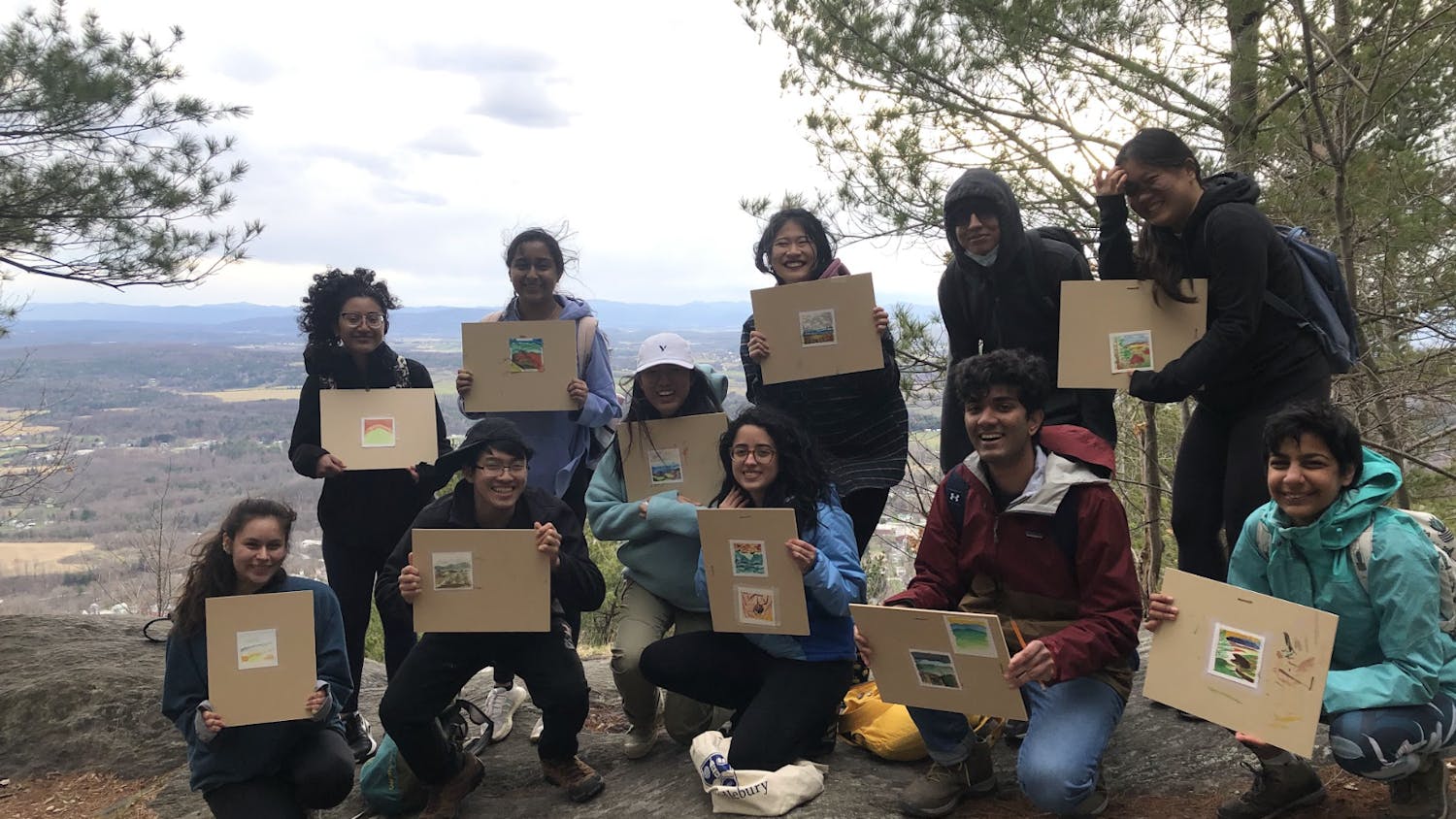Two weeks ago, seven candidates running for governor of Vermont, including incumbent Governor Peter Shumlin, gathered at Vermont PBS for a 90 minute debate on issues including healthcare, the heroin epidemic and the rising cost of college tuition. The moderator, PBS viewers and the exclusively student audience all provided questions.
Stewart Ledbetter, host of the TV program “Vermont This Week,” moderated the debate. Each candidate had one minute to answer the given question, a rebuttal phase directed by the moderator, and a one minute closing statement. Ledbetter opened the debate by asking each candidate to introduce him or herself and to explain “how you have prepared for the top political office in the land.”
Pete Diamondstone of Brattleboro, a Vermont resident for about 50 years and a representative of the Liberty Union Party, was the first to introduce himself. Diamondstone has run for governor every time since 1970. “I am a revolutionary, nonviolent socialist, and I am a secessionist … As a revolutionary socialist, I have to tell you that most of what we will discuss tonight will not be relevant for me, because most of what I will talk about is how we overturn what is destroying our society and our environment, which is capitalism,” Diamondstone said.
Cris Ericson, an Independent who is also running for US Senate as the nominee of the Marijuana Party, spoke next. Ericson opened her introduction by harkening back to the days of her childhood when Vermont was “the garden of Eden.”
“We’ve got to stop the F-35 strike fighter jets from being based here, and we’ve got to stop the natural gas pipeline from being built underneath Lake Champlain,” Ericson said.
Dan Feliciano, running as a member of the Libertarian Party, introduced himself next. “I’m a father, I’m a husband, and I’m a veteran. I have three children, I live here in Essex,” Feliciano said.
Feliciano spoke of why he chose to run, after his wife told him that: “‘Now that our son is 16, we need to start thinking about what we’re going to do differently, because he will be leaving and never coming back.’” He decided that he needed “to do something about this and couldn’t stand idly by,” said Feliciano, who has a background in healthcare and turning around big businesses and government organizations. Feliciano emphasized his desire to make the state more affordable for families, provide better healthcare, reduce property taxes and offer school of choice.
Republican candidate Scott Milne, Governor Shumlin’s biggest competitor, introduced himself next. Milne grew up in Vermont and moved back in the late ’80s to take a family business that was located in New Hampshire.
However, “What I saw over the past 30 years was a continuing difference between New Hampshire and Vermont and the effect of tax policies and government on people to prosper, and that has drawn me into this race,” Milne said. He promised to offer a “great voice” for those who choose to support him.
Bernard (Bernie) Peters is running as an Independent. Peters is a retiree from the Agency of Transportation where he worked for 36 years. “I’ve been watching politics for quite some time … from what I see, whichever party is in power is not working for the Vermonter. Neither party seems to realize, that when they say they’re working for the party, they’re not working for the party. They’re working for the tax payer and the voter. They are the people who are the boss, not the other way around,” Peters said. “All it takes it a lot of good common sense and hard work from everybody,” Peters said.
Emily Peyton, an Independent from Putney, introduced herself as “an earth activist.” She entered the race “to bring forth the very exciting solutions, and the hopeful solutions that you have to help make the earth a livable place, a place that you can thrive.” Peyton explained that she came to talk about “Economic systems that can allow us to laterally grow the economy, and things that we can do to honor the earth, and live in harmony with each other and our natural world.”
Finally, incumbent Peter Shumlin, the nominee of the Democratic Party, spoke. Shumlin has served two consecutive two-year terms as governor and is seeking re-election for a third. “I love Vermont more than anything. And I ran for governor four years ago, because after building two businesses, successful businesses, in Vermont employing Vermonters, I felt that I wanted more students, more young people, to have the same opportunity that I’ve had in this state,” Shumlin said. Shumlin has and will continue to prioritize building a state “where our young people can stay, and work, and thrive.” He concluded by citing the many successes of his past two terms and asking for two more years.
The candidates debated healthcare first. Six months after winning the 2010 election, Shumlin passed a law creating a single-payer healthcare system in Vermont, making Vermont the first state in the nation to do so. However, a recent poll showed that Vermonters are deeply divided over the issue of healthcare, as are the candidates.
“Healthcare has a heavily IT-based solution, and I think that going to a single payer system really doesn’t do anything to drive down the cost of healthcare,” Feliciano said, citing the technology problems of
Vermont Health Connect and the national healthcare marketplace website. Feliciano advocated for free market solutions by opening up the market and letting more insurers into the state to drive down premiums through competition. “You pick your doctor, you pick your hospital, you pick your insurer,” he said.
Shumlin said that to address the rising cost of healthcare, Vermont must continue to follow through with the single payer system.
“First of all, I’d disagree with Peter Shumlin,” Milne said when asked about healthcare. He referred to Shumlin’s healthcare reforms as “a reckless march toward single-payer.” Milne mentioned the failure of the single-payer system after four years.
Some candidates offered novel ideas, such as Peters who suggested giving to issue of healthcare reform as a school project to students in Vermont, which has “some of the nicest schools on the East Coast.”
Hussain Al-Mahr, a student in the audience, asked how the candidates would lower the cost of college tuition and attract more students to Vermont colleges. Views on education costs were as diverse as those on healthcare. Shumlin spoke of the challenge of getting Vermont students from high school into college, an issue he has already addressed as governor by implementing the early college, dual enrollment programs and Vermont Scholars programs. Milne dismissed Shumlin’s programs as ineffective over the last two year, but did acknowledge that the cost of college has risen above what most Vermonters can pay. By lowering the cost of kindergarten through twelfth grade education, Milne hopes to be more generous with scholarships for Vermont students going to college in Vermont.
“This issue of paying to go to school begins with an absurdity and if you accept it, you’ve accepted the absurd,” Diamondstone said. “We should be paying people to go to school. School is work … If a student goes to school and learns two and two is four, that student has contributed to the wealth of the society and should be paid,” said Diamondstone. Diamondstone continued to explain the flawed relationship between citizens and capital, and how a socialist society would change that.
“University of Vermont is a private for-profit college,” Ericson said. She was outraged at the amount of money it was receiving from the state and suggested that that money be redirected to the state colleges and to free, online education.
“There are debt-free methods of education. If you want to learn anything, you can go learn it, then we need a system of accrediting that learning,” Peyton said, referencing one called the People’s Free University. As another solution to the rising cost of college, Peyton suggested “increasing our food independence by giving people of your age land in order to make our state food secure.”
The moderator then asked what the governor would do to improve wages in the state. Milne would solve this problem by making Vermont more business-friendly through tax incentives and improving the education system. Shumlin would grow wages and employment primarily through education and job training at every level.
“We need to completely convert to a socialist system of manufacturing,” Diamondstone said. According to Diamondstone, this is the only way people can ensure that they are not getting ripped off by employers.
“How can we create a monetary system so that the economy spurts up from the ground?” is the central question around improving wages, Peyton said. She is not a supporter of “trickle-down” economics.
“They’re going to go by us like roadkill on the interstate,” Peters said, explaining how businesses will not choose to locate in Vermont because the state is not business friendly. His solution would be to keep more of the well-educated Vermont students in the state. Feliciano focused primarily on cutting costs, reducing taxes and eliminating laws that prevent businesses from expanding.
J.T. Lukens of 350 Vermont submitted the next question online: “Do you support divesting Vermont’s pension funds from fossil fuel companies?” Shumlin responded first, noting Vermont’s commitment to green energy through the increase in solar and wind power over the last several years. In terms of divestment, “it’s not the sharpest tool that we have in the drawer,” Shumlin said, but that he would be willing to look into it.
“One good reason to have fossil fuels in our portfolio is … to hedge against a bet we’re doing, rushing toward this renewable energy program,” Milne said. He would not support divestment, citing other, more pressing issues. Neither Peters nor Feliciano would not support divestiture of the pension portfolio either.
“We need to make our earth a priority,” said Peyton, a strong supporter of divestment. She also spoke of the need to stop using oil and start using things like hydro-power. She suggested creating more buildings out of agricultural hemp, using the quarter of the energy needed for normal buildings.
“Capitalism not only rips off works, it rips off the planet,” Diamondstone said. Diamondstone supports divesting all capital investments and opening a state bank.
Ericson would begin her term as governor with a “complete forensic examination of the pension fund” to eliminate fraud. She did not mention divestment.
Student audience member Beatrice Woodruff asked the next question concerning the drug problem and new measures to combat it.
“This is the one area that can really destroy Vermont ... are we doing enough? No,” Shumlin said. He referenced his increase in penalties for dealers and his new approach, looking at opiate addiction as not just a law enforcement problem, but a healthcare problem. He emphasized the need for more prevention. Feliciano thinks that Shumlin has “a good approach” and “wouldn’t change anything.”
“This is something I applaud Peter for,” Milne said.
Peters spoke of the importance of keeping kids from getting into drugs, or “it won’t be long until they can’t tie their shoes or anything,” said Peters, who supports harsh penalties for drug dealers.
“Notice, there was no heroin in the United States when the Taliban were in control in Afghanistan,” said Diamondstone, also a supporter of harsh penalties for dealers.
Peyton wants to “reign back” pain medication prescriptions and look toward alternate methods to control pain, such as marijuana or hypnosis.
Ericson began by questioning Shumlin’s alleged choice to give $5 million to a ski resort for a new snow blower, rather than toward a new drug treatment facility. “Peter, did you do that?” Ericson said.From the issue of opiates, the moderator segued into the need to fix Department of Children and Families (DCF), which has been under more stress with the rise of the heroin epidemic.
Peyton suggested a family mentoring system for families who need help making good choices.
Shumlin said that the number of case workers have increased and the policy for returning children to their parents has become more stringent, but there is still more to do to improve the department and keep Vermont’s children safe.
Peters pointed out that many of the people who get their children back often have them taken away again for a repeat offense, which puts the children in more danger. “If they’ve got a criminal record that bad, something bad’s going to happen,” Peters said. He believes that social workers “have their hands tied” by rules, but should instead be working more off their intuition.
Each candidate was given the opportunity to make a closing statement.
“If you could have all the money in the world, or you could have all the love in the world, which has more value?” Peyton said. She urged Vermonters to “improve the quality of loving in your life.”
Diamondstone emphasized the need to reallocate resources away from violence toward workers and the planet so as to benefit everyone on the planet
Ericson said she will do everything in her power to stop the pipeline and to get the F-35 fighter jets out of Vermont.
Feliciano reiterated his platform of cutting spending, getting rid of single-payer, providing school choice, cutting property tax and growing businesses.
“I’m a candidate who’s about as grassroots as you can get. I don’t have big business behind me, I don’t have corporations behind me, I don’t have nobody from out of state behind me,” said Peters, who is running as the Vermonter candidate with Common Sense for Vermont People.
“I want to make this state a place where more young people can succeed,” Shumlin said, asking for two more years to continue to improve Vermont. He thanked Vermont for the four previous years as governor.
Milne concluded by speaking of his mother, who was involved in Vermont politics 20 years ago.
Following the debate, the seven candidates made their way through the audience of students, shaking hands, taking pictures with students and meeting the future members of Vermont’s electorate.
Serious Issues, Silly Solutions: The Vermont Gubernatorial Candidates Debate

Comments



